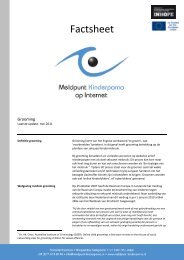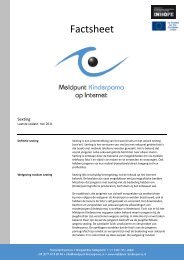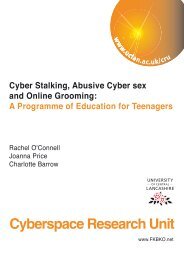sexual exploitation of children over the internet - Meldpunt ...
sexual exploitation of children over the internet - Meldpunt ...
sexual exploitation of children over the internet - Meldpunt ...
You also want an ePaper? Increase the reach of your titles
YUMPU automatically turns print PDFs into web optimized ePapers that Google loves.
majority <strong>of</strong> investigations — approximately 70 percent — take place at <strong>the</strong> state or locallevel. For this reason, Committee staff also interviewed several state ICAC Task Forceinvestigators.Interviews and meetings with law enforcement <strong>of</strong>ficials and agents revealed severalkey factors which have contributed both to <strong>the</strong> proliferation <strong>of</strong> child abuse images on <strong>the</strong>Internet as well as <strong>the</strong> obstacles law enforcement agents face when <strong>the</strong>y try to identify <strong>the</strong>individuals who possess and distribute <strong>the</strong>se images. First, and perhaps most daunting, is<strong>the</strong> number <strong>of</strong> child abuse images on <strong>the</strong> Internet. As mentioned previously, UnitedStates law enforcement estimates that <strong>the</strong>re are approximately 3.5 million known childpornography images online. In addition, <strong>the</strong> individuals who trade and distribute childpornography images use sophisticated technology and o<strong>the</strong>r means to evade identificationby law enforcement agents. For example, law enforcement agents said that individualswho download images can use “anonymizers” or encryption technology which makes itdifficult to find <strong>the</strong> individuals, much less prove that <strong>the</strong>y possessed or downloaded <strong>the</strong>images. Law enforcement agents also stated that most Internet Service Providers <strong>of</strong>tendo not retain Internet Protocol, or IP, address data for a sufficient period <strong>of</strong> time.Without this data, law enforcement agents are unable to identify <strong>the</strong> individual at acertain IP address who has downloaded or distributed child pornography. Fur<strong>the</strong>r, lawenforcement agents are concerned that <strong>the</strong> response time <strong>of</strong> ISPs to law enforcementinquiries or subpoenas seeking <strong>the</strong> identity <strong>of</strong> a customer assigned to a particular IPaddress varies and is not always timely. Dr. Frank Kardasz, a member <strong>of</strong> <strong>the</strong> ArizonaICAC Task Force, testified that a two-day response time to law enforcement subpoenasfor IP address information would be ideal.Law enforcement <strong>of</strong>ficials also explained that <strong>the</strong> payment schemes used bycommercial child pornography websites are becoming increasingly complex andsophisticated, again, as a method to evade detection. One example cited by lawenforcement <strong>of</strong>ficials and by NCMEC is <strong>the</strong> increasing use <strong>of</strong> digital currencies as amethod <strong>of</strong> payment on commercial child pornography websites. Payment by digitalcurrencies makes it more difficult for law enforcement agents to trace <strong>the</strong> payment, andthus, <strong>the</strong> source.In addition to examining how law enforcement <strong>of</strong>ficials investigate and prosecutethose who exploit <strong>children</strong> <strong>over</strong> <strong>the</strong> Internet, Committee staff reviewed and analyzedexisting federal law with regard to criminal penalties for possession, creation, anddistribution <strong>of</strong> child pornography. A review <strong>of</strong> federal and state law showed that whilepenalties for federal charges can be quite severe — for example, <strong>the</strong> federal sentence fordistribution <strong>of</strong> child pornography is up to 20 years, with a five year minimum mandatorysentence, per image — <strong>the</strong>re is great disparity among state penalties for crimes involvingchild pornography. Because <strong>the</strong> vast majority <strong>of</strong> <strong>the</strong>se online child <strong>sexual</strong> <strong>exploitation</strong>cases are prosecuted on <strong>the</strong> state level, it is imperative that all states consider adoptingstrict sentencing schemes for <strong>the</strong>se crimes and laws that clearly address <strong>the</strong> onlineenvironment in which <strong>the</strong>se crimes are now committed. For example, all states shouldconsider adopting laws that make clear that <strong>sexual</strong> solicitation <strong>of</strong> a person believed to bea minor online is a felony <strong>of</strong>fense, with automatic jail time. In addition, Committee staff16















